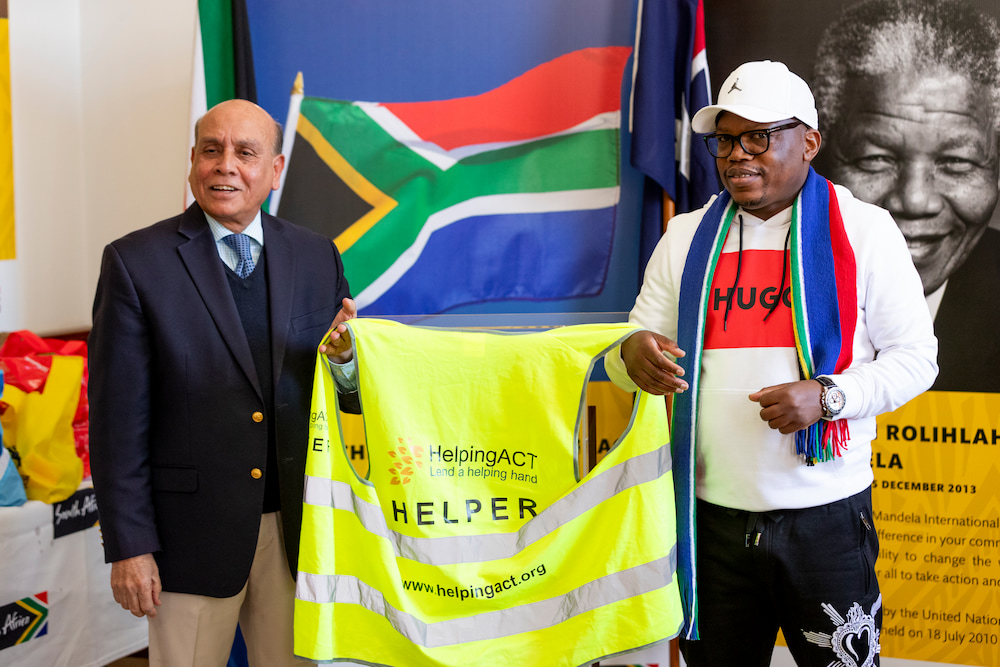“As long as poverty, injustice, and gross inequality persist in our world, none of us can truly rest,” Nelson Mandela, South Africa’s first black president, said in his 2005 Trafalgar Square address, calling for an end to poverty in the developing world.
Even here, in affluent Canberra, poverty has increased, and hunger and demand for food have tripled in recent years, but the community sector has not rested in its efforts to combat it.
To mark Mandela Day (18 July), the birthday of the Nobel Peace Prize-winning statesman (1918–2013), the South African High Commission launched a food donation campaign for food relief charity HelpingACT.
Mandela Day, proclaimed by the United Nations in 2009, honours Mandela’s life and legacy, and is “a tribute to his unwavering values and his extraordinary commitment to the service of humanity”, Lebogang Mokwena, First Secretary of the South African High Commission, explained.
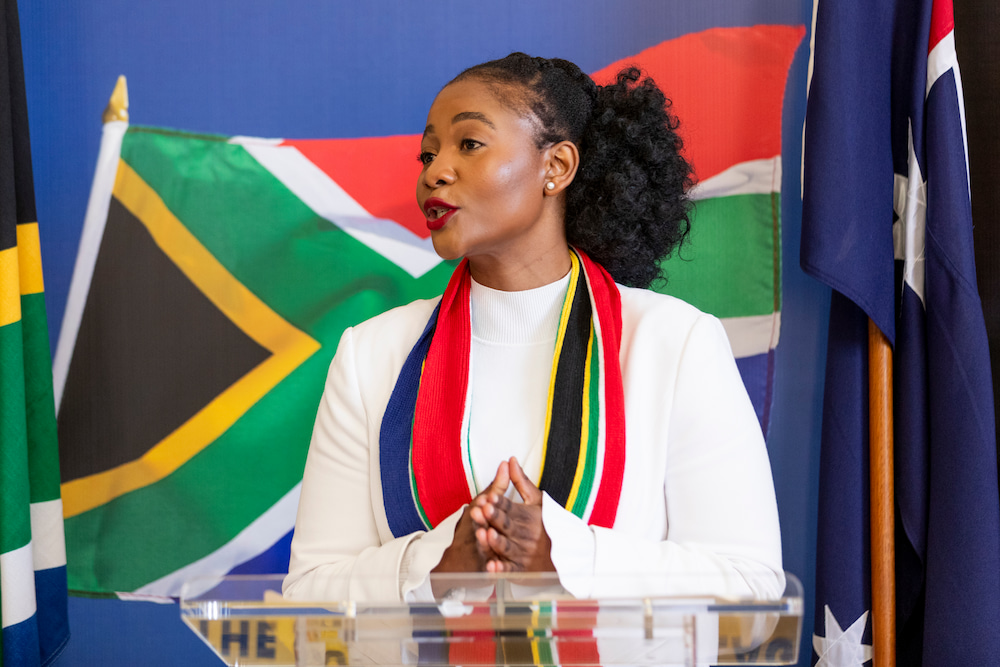
People are encouraged to spend 67 minutes taking part in good works, “emblematic of the 67 years Mandela devoted to the fight for human rights and the dismantling of apartheid”, Ms Mokwena said. Mandela had “expressed his heartfelt wish that such a day could unite people worldwide in a battle against poverty and in the promise of peace and reconciliation”. This year’s theme was ‘It’s still in our hand to combat poverty and inequality’.
“July 18 stands as a beacon of hope and action,” Ms Mokwena said. “This day transcends a mere commemoration; it is an international clarion call to honour Madiba’s legacy.
“I stand before you to echo Madiba’s call and ask you to join the global movement for good. Take action, inspire change, and strive to make every day a Nelson Mandela Day.”
The High Commission invited all diplomatic missions to donate non-perishable food for vulnerable Canberrans. At a function, the High Commission gave HelpingACT the food they had collected: enough to feed 50 families for a month.
“It is with great pride that the High Commission collaborated with HelpingACT, an organisation of formidable repute,” Ms Mokwena said.
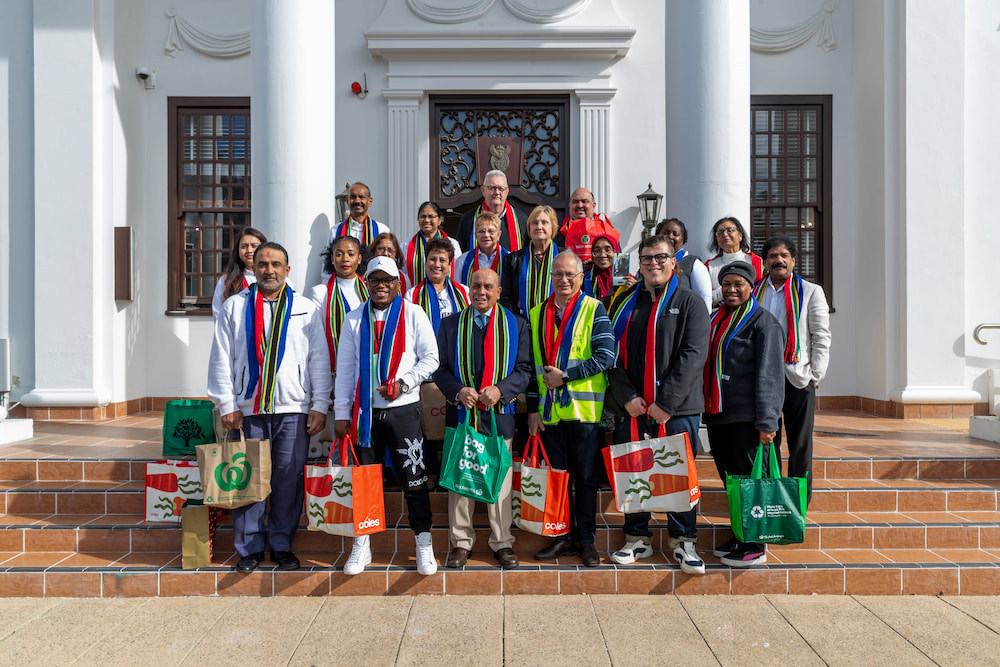
HelpingACT was launched in 2017 to provide food to vulnerable Canberrans: refugees and asylum seekers, homeless people, international students, and anyone else in need, so that nobody sleeps hungry in the ACT. Its founder and president, Mohammed Ali, was named Canberra Citizen of the Year in 2022, and one of its volunteers, Mijica Lus, recently named ACT Young Woman of the Year; the previous Governor-General commended the charity’s work; and ACT politicians regularly serve food at their barbecues for homeless people.
“HelpingACT not only assists those in need within the ACT community, but also extends support to displaced individuals, victims of domestic violence, and refugees seeking to resettle in the new host country,” Ms Mokwena said.
“The impact of HelpingACT’s selfless service is beyond measure. In the words of President Nelson Mandela: ‘Overcoming poverty is not a task of charity. It is an act of justice. … Like slavery and apartheid, poverty is not natural. It is man-made and it can be overcome and eradicated by the actions of human beings. … Sometimes it falls upon a generation to be great. You can be that great generation. Let your greatness blossom.’”
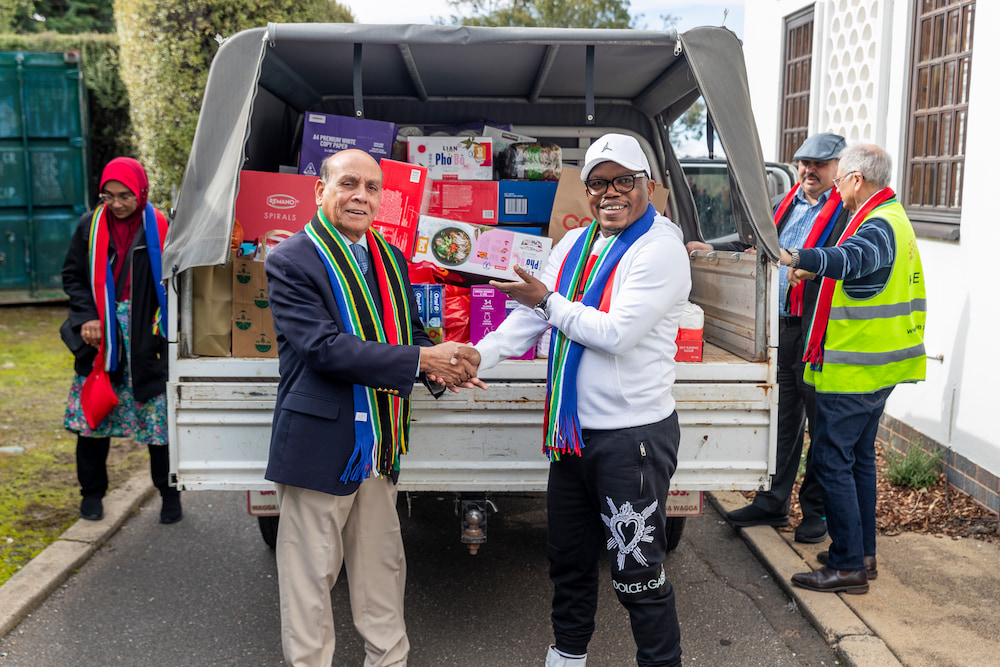
Donations came from the High Commissions of Mauritius, Samoa, Sri Lanka, and Uganda; the Embassies of the Netherlands, Russia, and Vietnam; and the United Nations Association of Australia.
“Your support exemplifies a remarkable spirit of collaboration and generosity,” Ms Mokwena said. “It is a testament to the fact that diplomatic missions’ concerns extend far beyond the realms of political and economic engagement. We are deeply committed to addressing social issues, fostering a community that cares, and building bridges of humanitarian support. Together, we have demonstrated that diplomacy is not just about policies; it is about people and the positive impact we can create in their lives.”
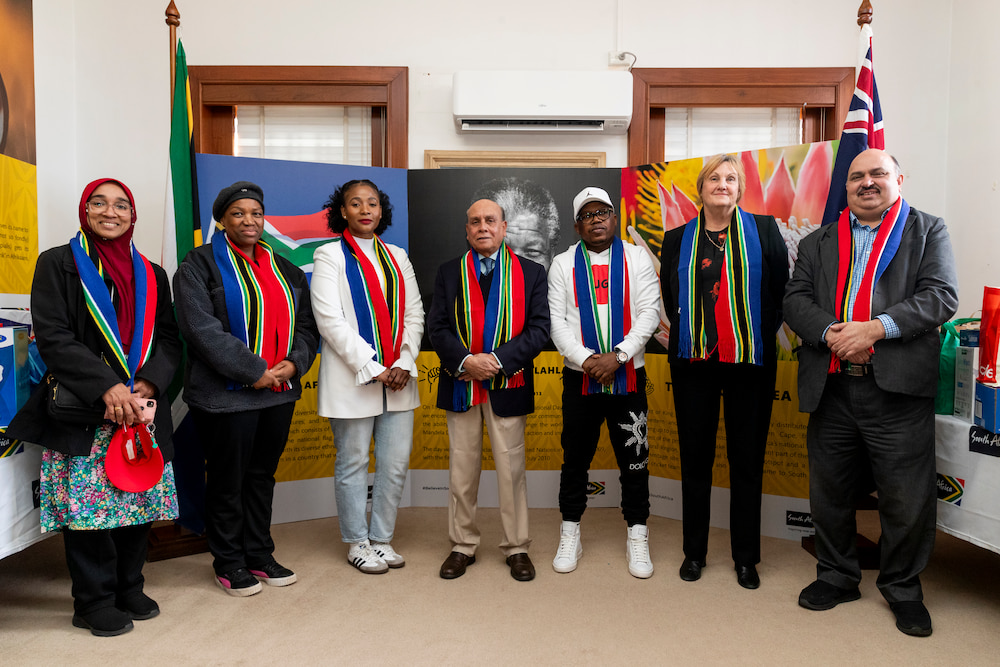
Mohammed Ali thanked the High Commission and other missions for their generosity.
“We are so grateful that this year [the High Commission] chose HelpingACT as their partners for making an impact on the community, especially those who are vulnerable,” Mr Ali said.
“You are the bearer of the legacy of one of the greatest men in the world, Nelson Mandela. You are keeping that flame – that passion to help others, to help the vulnerable – alive and well-lit, and you will find HelpingACT always there with you in any future endeavours.”
Rotary and the Islamic School of Canberra also attended.
The following week, on 25 July, high commissioner Leonard Khoza and diplomatic staff visited HelpingACT’s food station in the Theo Notaras Multicultural Centre, Civic.
There, they shelved food and packed bags: 20 bags for vulnerable families (10 already picked up this weekend) and 20 bags for homeless people.
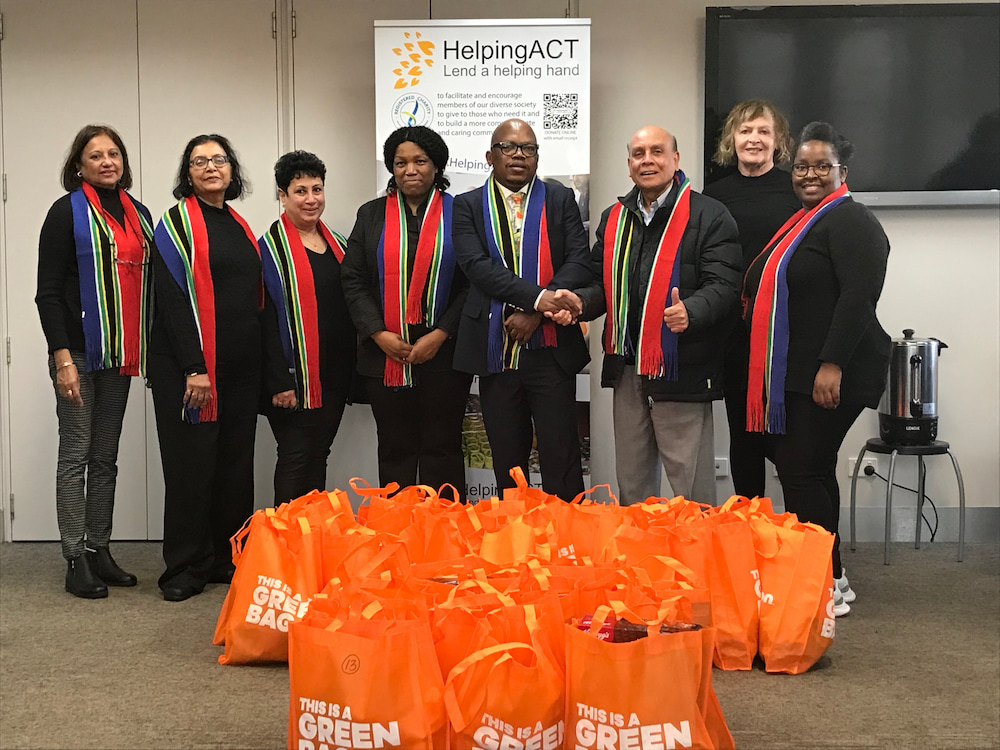
HelpingACT will give those out at a lunch at the Early Morning Centre, the community hub for homeless people in Northbourne Avenue, on 5 August, marking the start of Homelessness Week.
“This is a mammoth contribution by the South African High Commission,” Mr Ali said.
He hoped that other high commissions would follow suit and contribute.
“If we are the fortunate persons who do not need any help, then we are the persons who can donate and give help to others,” Mr Ali said.
Poverty and hunger in Australia’s capital
And that help is needed as the cost-of-living crisis continues, the community sector maintains. Nine per cent of Canberrans live in poverty: an estimated 38,300 people, including 9,000 children. The ACT Council of Social Service (ACTCOSS) testified last week that homelessness is increasing; that a large number of people are accessing community services who would not have needed to five years ago; and that many cannot afford to buy food or to heat their homes, or even to put a roof over their heads.
“These are the people who have nowhere to go, no matter if it is sunny, or raining, or dead cold,” Mr Ali said. “When they come [to our homeless dinners], they feel honoured that something is being done for them. My question is: why are we not meeting their needs, and why is the number increasing? … This situation is really bad, and they need our help – not just physically and foodwise, but also to sit with them and talk to them. Sometimes even talking to them acts as therapy, relieving them of their mental stresses.”
In the six years since HelpingACT was established, the quantity of food needed has increased exponentially, Mr Ali said. Demand for food assistance has doubled in the last year: previously, only one in 10 Canberrans needed food assistance, he estimates; now, two in 10 do. Once, seven or eight families would turn up to get food; now, at least 12, sometimes as many as 18 families come each week.
“The need for food is worsening,” Mr Ali said. “I’m sorry to raise this alarm. But when I look back, the number of families who are coming is silently increasing. There are more demands coming from domestic violence families. There are more demands coming from schools in Canberra.”
Only last week, HelpingACT added a seventh school to its breakfast program.
“That is an indication and alert that, even though we are trying to address this situation, still we are far away from getting any wonderful, dignified solution to the problem.”
HelpingACT meets Chief Minister
Earlier this month, HelpingACT met Chief Minister Andrew Barr to discuss the increasing demand for food services.
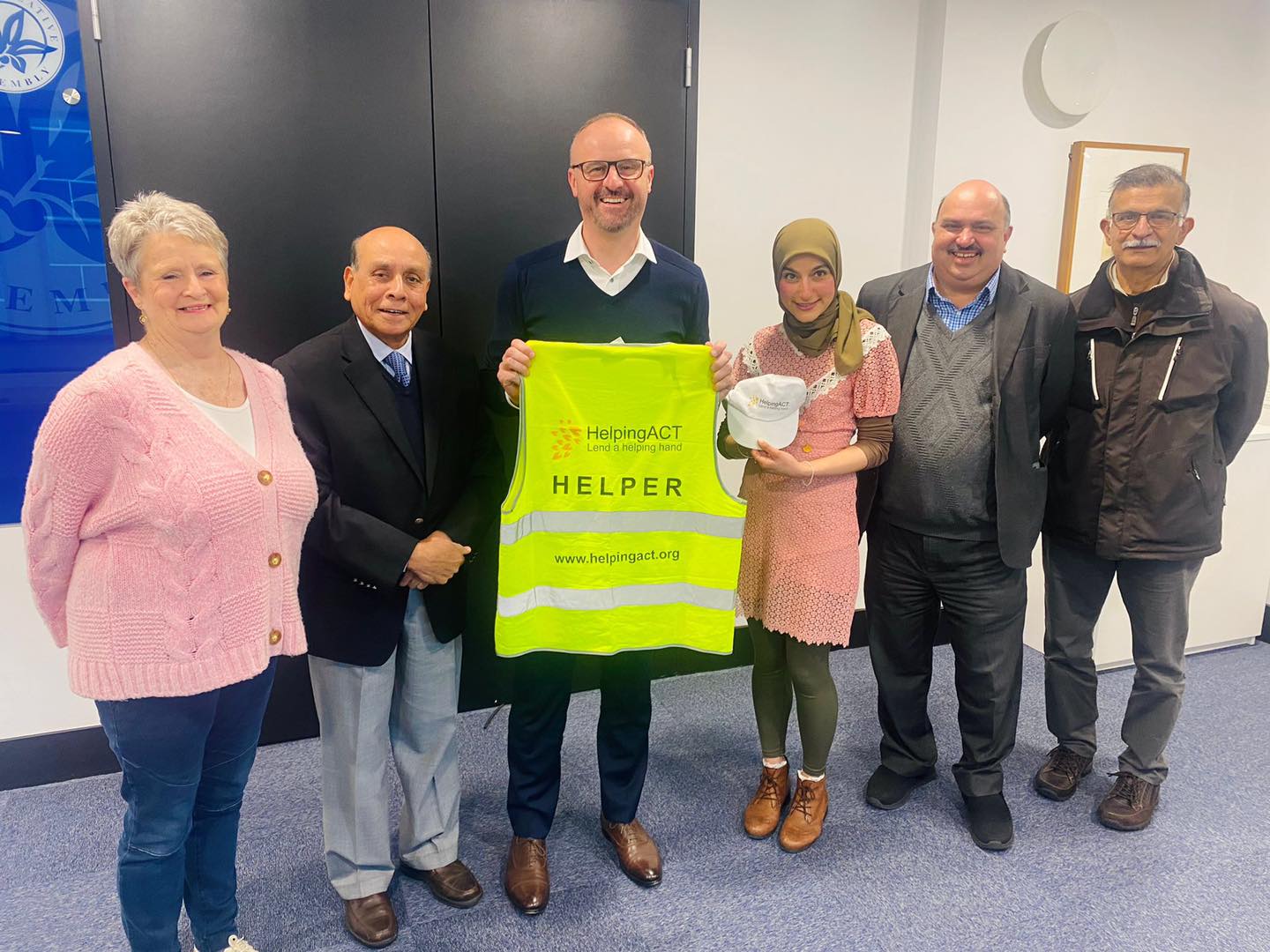
The charity has asked the government for more space in the Civic Multicultural Hub, a new space in South Canberra to start a southside foodbank, and help in buying a vehicle to transport trauma-affected clients to health services and shopping centres.
The meeting was “productive”, an ACT Government spokesperson said.
Mr Barr recommended that HelpingACT register to be considered for government-owned vacant space, southside and northside, that might be suitable to operate from. He suggested the University of Canberra and the Woden Canberra Institute of Technology campus (which will be built next year) as possible locations. Mr Barr also advised that the charity partner with Hands Across Canberra, the ACT’s community foundation, which administers the Chief Minister’s Charitable Fund.
“We are so thankful for his time and for providing generous suggestions,” Mr Ali said. “I’m so thankful that Andrew Barr listened to us, and his office took note. I’m sure that things have started moving, and that means that in the coming year, we will have some space there in the south, as well as in the Belconnen or Gungahlin area.”
The community can also aid HelpingACT’s work by donating. (Ideally, Mr Ali says, 4,000 families would donate $10 a month.) Those in need can contact the charity online.
“Vulnerable people is the problem of the community; it can only be solved by the community itself,” Mr Ali said. “Together, we can certainly achieve that day when there will be no-one struggling for food or sleeping hungry in Canberra. Please come forward and help; your help means life not only for HelpingACT but for all of the people who are in need.”
Or, as Nelson Mandela told his audience in 2005: “Do not look the other way; do not hesitate. Recognise that the world is hungry for action, not words. Act with courage and vision.”

